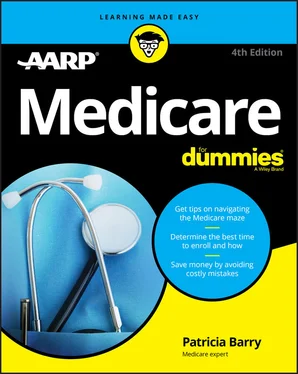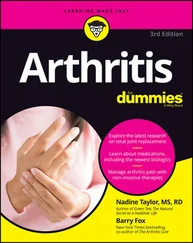 Part D doesn’t pay for drugs covered by Parts A or B. So if any of your meds are in question, your Part D plan may require information from you and your doctor — usually concerning any related medical treatment, such as surgery — before covering them. For this reason, Part D plans often place a prior authorization restriction on such drugs to determine whether Part A, B, or D should cover them. Your doctor may be able to settle this matter over the phone or may help you file a speedy exception request, as Chapter 14explains. Either way, your doctor needs to explain why a prior authorization shouldn’t apply in this case.
Part D doesn’t pay for drugs covered by Parts A or B. So if any of your meds are in question, your Part D plan may require information from you and your doctor — usually concerning any related medical treatment, such as surgery — before covering them. For this reason, Part D plans often place a prior authorization restriction on such drugs to determine whether Part A, B, or D should cover them. Your doctor may be able to settle this matter over the phone or may help you file a speedy exception request, as Chapter 14explains. Either way, your doctor needs to explain why a prior authorization shouldn’t apply in this case.
The Gaps: Discovering What Medicare Doesn’t Cover
Although Medicare covers a multitude of medical services, it also has some yawning gaps. Some may surprise you, so the following sections address the broad areas that Medicare doesn’t normally cover, together with some tips for alternative ways of filling in the gaps. Being aware of them from the start is better than being disappointed if Medicare denies coverage after the fact.
Routine hearing, vision, dental, and foot care
The older you get, the more you’re likely to need professional attention for your ears, eyes, teeth, and feet. But Medicare doesn’t cover routine services to take care of these parts. Routine is the key word here. Medicare pays to treat problems it considers medically necessary (including cataract surgery, jaw restoration after injury, and treatment for diseases of the ear) but not the kind of care you may need on a regular basis, such as the following:
Ear exams, hearing aids, or having hearing aids fitted
Vision tests, eyeglasses, or contact lenses
Oral exams, teeth cleaning, extractions, or dentures
Toenail clipping or the removal of corns and calluses
 However, routine services for ears, eyes, and teeth may be covered if you’re enrolled in a Medicare Advantage plan that provides them as extra benefits. Some plans offer them as separate benefit packages for an additional premium. Not all plans offer coverage for this routine care, but those that do are identified in the plan finder program on Medicare’s website (
However, routine services for ears, eyes, and teeth may be covered if you’re enrolled in a Medicare Advantage plan that provides them as extra benefits. Some plans offer them as separate benefit packages for an additional premium. Not all plans offer coverage for this routine care, but those that do are identified in the plan finder program on Medicare’s website ( www.medicare.gov/find-a-plan/questions/home.aspx ) with small logos: D for dental, V for vision, and H for hearing. See Chapter 11for info on using the plan finder to compare details of Medicare Advantage plans.
Of course, as always in Medicare, some exceptions exist. You can get coverage for foot care in certain circumstances — for example, if you have foot problems caused by conditions such as diabetes, cancer, multiple sclerosis, chronic kidney disease, malnutrition, or inflammation of the veins related to blood clots — especially if the act of toenail clipping would be hazardous to your health unless done by a professional. But the bottom line is that to get Medicare coverage for foot care, you need your doctor or podiatrist to provide evidence that said care is medically necessary.
Medicare spends billions of dollars a year on treating the results of falls, and older Americans are five times more likely to end up in the hospital for falls than for any other injuries. So you’d think that Medicare would try to save at least some of those billions by covering safety items that help prevent people from falling. But no, it doesn’t.
To be sure, Medicare covers a few items it deems medically reasonable if prescribed by a doctor — for example, seat lifts that help incapacitated people sit down or get up from a chair, or trapeze bars that help people sit up or alter positions when confined to bed. But Medicare doesn’t pay for equipment it considers items of convenience rather than of medical necessity. A long list of non-covered items includes stair lifts or elevators, bathtub lifts or seats, grab bars, room heaters, air conditioners, humidifiers, posture chairs, massage devices, physical fitness equipment, and medical emergency alert systems.
 But you may be able to get help in other ways:
But you may be able to get help in other ways:
If you’re a veteran with disabilities, be aware that the Department of Veterans Affairs has little-known programs that provide cash grants to help eligible vets make safety improvements in their homes. Call the VA at 877-827-3702, email sahinfo.vbaco@va.gov , or go to www.benefits.va.gov/homeloans/adaptedhousing.asp .
If your income is limited, contact the nonprofit organization Rebuilding Together, which provides volunteers to make housing repairs and install safety equipment free of charge. Call 800-473-4229 or go to http://rebuildingtogether.org for local information.
If you file itemized tax returns, you may be able to deduct the costs of home improvements for medical reasons, as I indicate in Chapter 4.
Many people are surprised, and often alarmed, to discover that Medicare doesn’t cover long-term care in nursing homes. I’m not talking here about short-term stays in a skilled nursing facility (most of which are nursing homes) after leaving the hospital; Medicare does cover those stays in specific circumstances. (I describe this kind of skilled nursing care earlier in this chapter and explain the ins and outs of qualifying for it in Chapter 14.)
But what if you become too sick or incapacitated to live at home and need the constant long-term care that a nursing home provides? Medicare will continue to cover your medical needs, but it won’t pay for what it calls custodial care, which refers to help with the activities of daily life such as using the bathroom, dressing, and so on. Nor will Medicare pay for your room and meals in a nursing home. These same rules apply to assisted living facilities.
Most people living in nursing homes pay for their custodial care out-of-pocket — with the help of long-term-care insurance, if they’ve purchased it — until their resources run dry. At that point, they usually become eligible for Medicaid, the state-run health-care system for people with very limited incomes and resources, which does pay the custodial care bills of people who qualify. (Because of the similarity in names, many people confuse Medicare and Medicaid, especially when it comes to thinking about long-term care.)
Eligibility rules for Medicaid vary from state to state. (And the name of the program is different in some states — for example, MediCal in California, MassHealth in Massachusetts, and TennCare in Tennessee.) To find out how the rules apply to you or a family member, you may need to consult an informed counselor or a qualified elder care attorney.
 For contact information of people who can help, check out the official document “Your Guide to Choosing a Nursing Home or Other Long-Term Services and Supports” at
For contact information of people who can help, check out the official document “Your Guide to Choosing a Nursing Home or Other Long-Term Services and Supports” at www.medicare.gov/Pubs/pdf/02174-Nursing-Home-Other-Long-Term-Services.pdf . You can also visit www.medicare.gov/nursinghomecompare/search.html .
Medicare doesn’t pay for medical services outside of the United States and its territories except in these extremely rare circumstances:
Читать дальше

 Part D doesn’t pay for drugs covered by Parts A or B. So if any of your meds are in question, your Part D plan may require information from you and your doctor — usually concerning any related medical treatment, such as surgery — before covering them. For this reason, Part D plans often place a prior authorization restriction on such drugs to determine whether Part A, B, or D should cover them. Your doctor may be able to settle this matter over the phone or may help you file a speedy exception request, as Chapter 14explains. Either way, your doctor needs to explain why a prior authorization shouldn’t apply in this case.
Part D doesn’t pay for drugs covered by Parts A or B. So if any of your meds are in question, your Part D plan may require information from you and your doctor — usually concerning any related medical treatment, such as surgery — before covering them. For this reason, Part D plans often place a prior authorization restriction on such drugs to determine whether Part A, B, or D should cover them. Your doctor may be able to settle this matter over the phone or may help you file a speedy exception request, as Chapter 14explains. Either way, your doctor needs to explain why a prior authorization shouldn’t apply in this case. However, routine services for ears, eyes, and teeth may be covered if you’re enrolled in a Medicare Advantage plan that provides them as extra benefits. Some plans offer them as separate benefit packages for an additional premium. Not all plans offer coverage for this routine care, but those that do are identified in the plan finder program on Medicare’s website (
However, routine services for ears, eyes, and teeth may be covered if you’re enrolled in a Medicare Advantage plan that provides them as extra benefits. Some plans offer them as separate benefit packages for an additional premium. Not all plans offer coverage for this routine care, but those that do are identified in the plan finder program on Medicare’s website ( 










